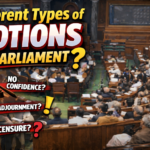Article 370 scrapped, Jammu & Kashmir to be carved into two Union Territories

The Centre scrapped Article 370 of the Constitution that grants special status to Jammu and Kashmir;the government has decided to bifurcate the state into two Union Territories – Jammu and Kashmir, which will have a legislature, and Ladakh, which will be without a legislature.
- The enabling provision of Article 370 that channels the implementation of Central laws and Constitutional provisions in Jammu and Kashmir with the concurrence of the State Legislature was scrapped.
- The abrogation suspends the clause that allowed all laws to be first be ratified by the state assembly, which currently stands dissolved.
- President Ram Nath Kovind has exercised his power under Clause 1 of Article 370. The presidential order(Article 370 shall cease to be operative except Clause (1) ) has done away sections under Article 35A, which provides special privileges to “permanent residents” of the state while defining the term “permanent residents”;amends Article 370 of the Indian Constitution and scraps its 65-year-old predecessor, .The Constitution (Application to Jammu and Kashmir) Order of May 14, 1954.
- It has effectively allowed the entire provisions of the Constitution, with all its amendments, exceptions and modifications, to apply to the area of Jammu and Kashmir.”.
- So far, the Parliament had only residuary powers of legislation in J&K. This included enacted of laws to prevent terror and secessionist activities, for taxation on foreign and inland travel and on communication. Now, the Centre has proposed the Jammu and Kashmir Reorganisation Bill of 2019, which says the new Union Territory of Jammu and Kashmir would be administered/governed like the Union Territory of Puducherry.
- The Bill proposes wide powers to the Lieutenant Governor of the proposed Union Territory of Jammu and Kashmir and makes it the “duty” of the Chief Minister of the Union Territory to “communicate” all administrative decisions and proposals of legislation with the LG.
- The police and public order is to be with the Centre.
- The removal of the 1954 Order further also negates a clause which was added to Article 352. The Order had mandated that no proclamation of Emergency on grounds “only of internal disturbance or imminent danger shall have effect” in the State unless with the concurrence of the State government.
- The Bill reduces the total number of States in India from 29 to 28, and increases the total number of Union Territories from 7 to 9. Accordingly, Both the Union Territories shall be administered by the President acting through the Lieutenant Governor, to be appointed by him under Article 239 of the constitution.
- Article 239A of the Constitution, which applies to the UT of Puducherry, shall also apply to the UT of Jammu and Kashmir. Thus, for the UT of Jammu anJammu and Kashmir, there shall be a Legislature with a Council of Ministers; however, the UT of Ladakh shall not have a Legislature.
- The Lt. Governor has the discretion in all matters related to the All India Services and the Anti Corruption Bureau, and he is not bound by the advice of council of ministers.
Article 370 laid down that except for matters related to defence, foreign affairs, communications and issues specified in the Instrument of Accession of Jammu and Kashmir, Parliament needs the state government’s ratification for all other laws. So far, residents of the state lived under a separate set of laws, including those related to citizenship, ownership of property and fundamental rights.Jammu and Kashmir will now be governed by the laws applicable to other Indian citizens.Article 370 is placed under Part XXI ie Temporary and Transitional provisions of Constitution of India.






0 Comments